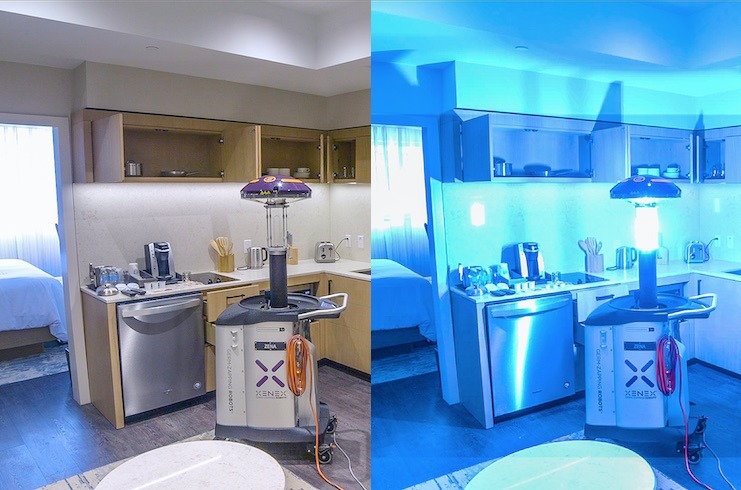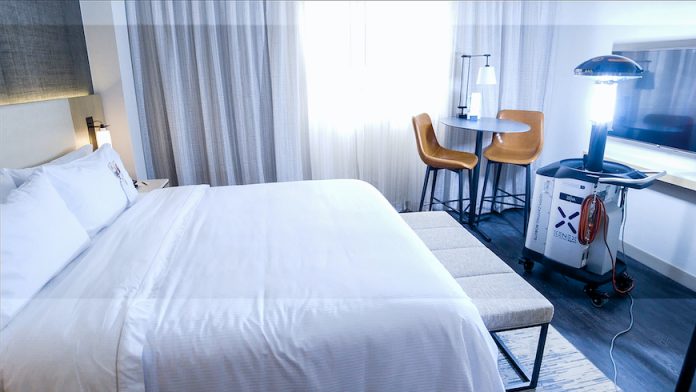Houston’s Texas Medical Center is the largest medical complex in the world. In the heart of this market, which draws more than 15 million annual visitors, is the new Westin Houston Medical Center. The hotel officially opened its doors at the end of January just as the World Health Organization declared the novel coronavirus outbreak a Public Health Emergency of International Concern. Weeks later on March 11, as the number of known COVID-19 cases in the United States climbed to more than 800, the hotel took action, using virus-killing robots to enhance the property’s disinfectant protocol. One week later, the number of known coronavirus cases in the United States has surpassed 5,000.
The Westin Houston Medical Center is the first U.S. hotel to use decontaminating robots from San Antonio-based Xenex Disinfection Services. Developed by two epidemiologists in Houston, the LightStrike Germ-Zapping Robots use intense pulsed xenon ultraviolet (UV) light to kill viruses, bacteria, and fungi, and are in use across hundreds of healthcare facilities as part of infection prevention programs.
Dr. Sarah Simmons, science director at Xenex Disinfection Services, said that the LightStrike robot has proven effective at killing another species of coronavirus: MERS. “Coronaviruses are a large family of viruses. Middle East Respiratory Syndrome (MERS), Severe Acute Respiratory Syndrome (SARS), and COVID-19 are examples of coronaviruses. The LightStrike robot has been proven effective at quickly deactivating Middle Eastern Respiratory Syndrome (MERS) coronavirus, just as it was proven effective at destroying Ebola virus and Candida auris,” Simmons said.
In light of the COVID-19 outbreak, Archit Sanghvi, vice president of operations for Pearl Hospitality, said that the Westin Houston Medical Center added two LightStrike robots to enhance its current disinfectant protocol. “As a hotel located in the world’s largest medical center, we are in a unique situation, especially in this time of uncertainty,” Sanghvi said. “To provide our guests and clients with an additional level of wellbeing, we decided to add another step to our current disinfectant protocol by implementing the germ-zapping UV light robots.”

After a guest checks out, their room is cleaned with both normal disinfectant protocols and a LightStrike robot. Operated by hotel staff, the robots use pulsed xenon, a noble gas, to create intense broad-spectrum UV light to quickly kill microscopic bacteria and viruses that the manual cleaning process might miss. The technology can clean a single guestroom in two or three cycles lasting two to three minutes each, depending on the room size.
Sanghvi added that this technology is being used to reduce the risk of contagion across the entire property. “It’s an added level of precaution the hotel has taken not only for guests, but also in back-of-house areas where staff take breaks, prepare for work, etc.”
In addition to deploying these robots, Sanghvi said that the hotel is following CDC guidelines and taking proactive measures to minimize risk while maintaining day-to-day business operations. The hotel’s current disinfectant protocol includes using hospital-grade cleaner in all public areas and guestrooms; disinfecting all consumable amenities in the guestroom and other items like remote controls on-site and placing them in sealed bags for guest use; removing all non-essential items from guestrooms like magazines, collateral, and decorative pillows; cleaning public areas like the hotel’s restaurant, café, lobby, and meeting rooms daily; and having a dedicated team member 24 hours a day to sanitize guest-facing public areas.











